On Sept. 27, six days after the Green Party of Canada had taken a terrible beating at the polls, Annamie Paul held a press conference announcing she would step down as the party’s ninth leader.
But later that day, as she attended a virtual meeting of the federal council, the GPC’s governing body, Paul threw a new twist into internecine wars that had been playing out for months.
“How many of you think I resigned today?” Paul reportedly told council members.
“All of us think you did,” replied Lorraine Rekmans, the GPC’s newly elected president and first Indigenous person to hold such a position with any major federal party.
“Well, I didn’t. I just started the process of my resignation,” Paul asserted.
And with that, Paul kept her hands on key levers guiding the party.
It seemed the already daunting process of reviving Canada’s federal Green party had just become even more fraught.
The Tyee interviewed a number of Green insiders to get a picture of what is next for the party that, as a long-time champion of climate action, seemed poised to make significant gains in the fall election. That prospect, sources said, was ruined not only by well-publicized internal power struggles, but by fumbled dealings at high levels and fundamental disputes over what the party stands for — problems that must be addressed for the Greens to sprout anew.
Here are challenging steps the party faces in the days, weeks and months ahead.
Step 1. Part ways with Annamie Paul
Paul’s surprise revelation to her council that she had not yet formally resigned signalled that a tortuous process lies ahead before she is gone from the Greens. As The Tyee heard, the stakes are high as tense negotiations proceed.
The fallout got uglier over this past weekend, when the Toronto Star ran a long report portraying a party “publicly collapsed into a self-destructive cycle of squabbling over arcane procedures, accusations of racism and bad leadership, and legal confrontation.” In the piece, Paul supporters blamed her predecessor as leader, Elizabeth May, for failing the new leader.
May followed up with a defence critical of Paul, who she said, still “alone controls what Canadians hear from our party.”
So is Paul still calling the shots? Neither Rekmans nor Paul responded to interview requests. However, a brief statement issued by the party the day after said that she would “step down as the leader of the Green Party of Canada in the coming weeks” and that she would remain as “leader until her resignation is finalized, at which point the party’s federal council will meet to appoint an interim leader.
“In accordance with the party’s constitution, a leadership contest will begin within six months of that appointment.”
In an interview from her home on Saturna Island, B.C., May, MP for Saanich-Gulf Islands, said she’d been told by Paul to “not talk to the media.” She refuses to obey. “We needed someone to not be afraid of her, which is why I decided I had to speak out,” said 67-year-old May, who expects to be “massacred” as a result of going public.
May said a “nightmare” has befallen the party, now “trashed.” Paul’s tendentious exit is making it even worse, she said, drawing a contrast with how she approached her own exit as leader in 2019. “I stepped down immediately and Jo-Ann Roberts, who was my deputy leader, was appointed interim leader the next day — so it was all very smooth.”
Paul, instead, is “creating chaos,” said May.
“She hasn’t left the building and controls all of the party’s communications, and I was never granted the authority to do that at any time. Our members need to hear from us, the media needs to hear from us.”
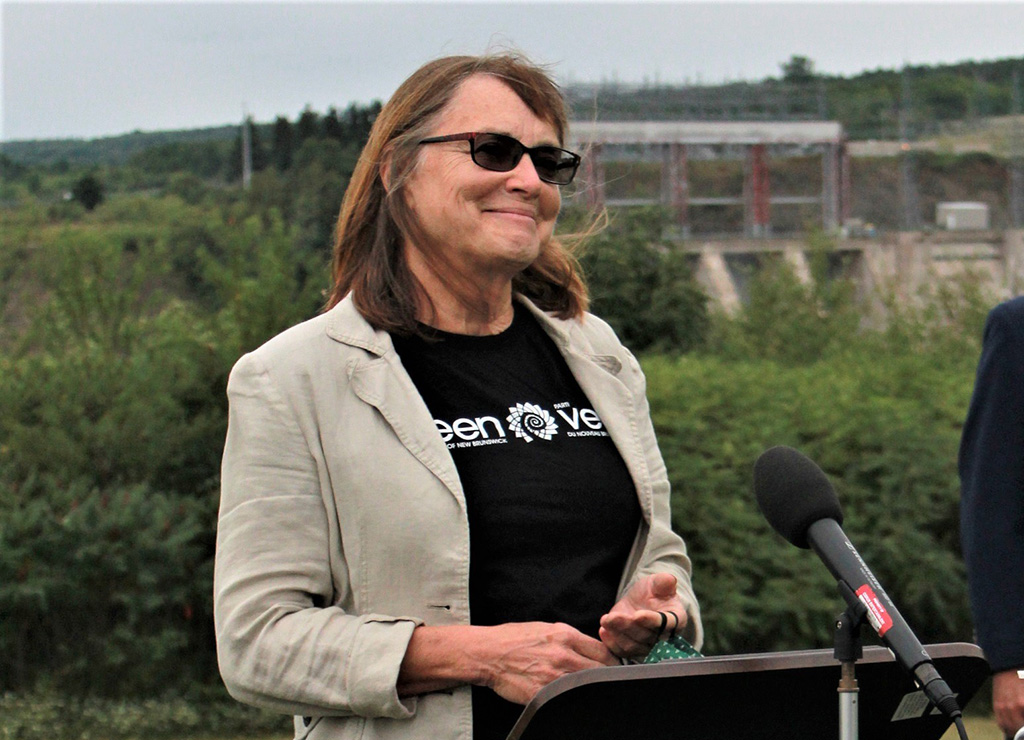
The logjam is making the Greens look out of it, even callous as an organization. “The party never officially thanked Annamie on social media for her service to the party, as the other federal party leaders did,” noted May.
According to May, John Chenery, the party’s communications director, blocked Rekmans — a member of the Serpent River First Nation in Ontario — from issuing a statement to mark last week’s first National Day for Truth and Reconciliation. Paul released her own statement.
Chenery told The Tyee that Paul explained her position on the statement to the federal council, but he declined to provide any further details.
May said that Paul is also “apparently trying to negotiate something” before her departure, which she believes might involve a severance package.
“The federal council can’t function with Annamie showing up to meetings and trying to organize motions that the council should instruct the party’s lawyers to start negotiating with her lawyer. Anyone who’s a lawyer knows that’s a massive conflict of interest.”
The federal council has already lost one of its members elected only in August, according to May, who will continue in her role as the Greens’ parliamentary leader in the House. May said that New Brunswick representative Louise Comeau stepped down in late September and quit the party.
Comeau, who holds a PhD in environmental management from the University of New Brunswick, said Paul blocked briefings to the council on the party’s financial and legal issues — and that the tipping point was when the outgoing leader “tried to influence the wording of the motion” regarding negotiations surrounding her departure.
“The stress and anxiety of those meetings affected my physical and mental health significantly and led me to understand [Paul’s] transition was not going to be easy,” said Comeau.
But Comeau may have already signalled her rebellion against Paul’s leadership two days before the federal election, when she came under fire for tweeting — in a since-deleted post — that “on the question of who is truly committed to climate action [and] if the choice is between two parties I say @JustinTrudeau.”
Step 2. Find an interim leader
Paul needs to step down immediately and the GPC’s federal council needs to appoint an interim leader as soon as possible to avoid the party spiralling into oblivion, said May.
But that person almost certainly won’t be May. She insisted that she will not serve in the interregnum position “even if they beg me. I think it would be a bad idea.”
Senior Green members The Tyee spoke to all suggested Paul Manly, who lost his re-election bid in the B.C. riding of Nanaimo-Ladysmith in this year’s federal election, should be named interim leader.
“Support is building for Paul Manly,” said Jo-Ann Roberts, who served in the interim role between May’s 2019 resignation and Paul’s 2020 election.
“He is respected across party lines. He has experience in the House of Commons and is able to work with Elizabeth — and he won’t put up with a lot from the federal council and he will make sure there is accountability.
“He will have to appoint some deputies because he doesn’t speak French. He also needs to think about his own re-election to the House of Commons. But [Manly] has said he won’t take the interim role without the full support of council.”
Manly declined an interview.
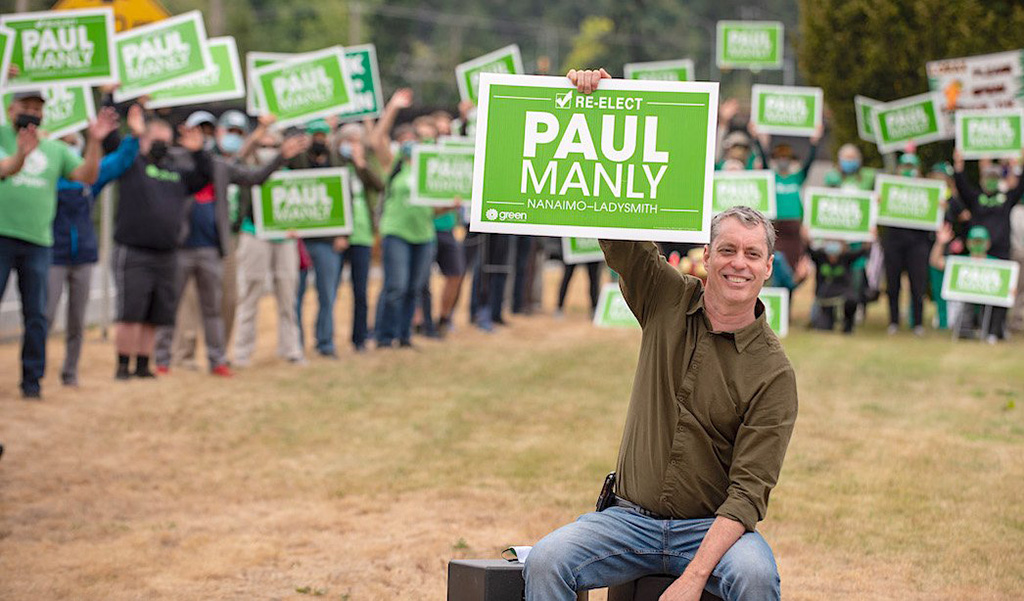
Roberts — a former CBC Radio broadcaster who ran as a Green candidate in three federal elections, including in Victoria in 2015 and Halifax this year — said the federal council could proceed with naming an interim leader while Annamie Paul remains on the payroll until her contract ends.
Unlike May, who stayed on council as former leader, Paul will not likely be extended the same courtesy since the council eliminated that emeritus role, added Roberts.
Step 3. Figure out what the Greens really stand for
Former Ontario Liberal cabinet minister and past Winnipeg mayor Glen Murray, who ran in last year’s federal Green leadership race and finished fourth, is not interested in the leader’s job, either on a temporary or permanent basis. But he wants to help rebuild the badly broken party.
“There are critical decisions the party has to make if it’s going to have any future, and there isn’t even a good process in place that’s working to make those decisions,” said Murray who spoke to The Tyee from Winnipeg.
“There are two major movements in the party right now,” he said. One is “a German-style, ecologically based mainstream Green party that is very strategic, more broad-based, which tilts progressive on issues like guaranteed livable income, and is focused on circular or regenerative economic approaches,” explained Murray, who places himself, and May, in that camp, adding that philosophy is also in play in New Brunswick, Prince Edward Island, Ontario and B.C., where the party has elected members in the provincial legislatures.
He said the other wing of the GPC swings to the left and is mainly represented in Quebec with members embracing an ideological blend of eco-socialism and Quebec nationalism. Montreal plaintiff-side securities class action litigator Dimitri Lascaris represented that group in the 2020 federal Green leadership contest in which he finished second.
“Now is the time for the Greens to focus on unity and strengthening the party,” Lascaris said in a statement released after Paul announced her intention to step down. “More than ever, Canada’s Green party is needed in the struggle for climate and social justice.”
But for 63-year-old Murray, the GPC’s main struggle is determining “in which direction to go. Its political future is very much tied to whether it is part of the circular economy as a centerpiece of what it does or whether it tilts to being an eco-socialist party.”
He said that unlike the chats he had with the other seven leadership candidates last year, Murray said he never had a conversation with Paul, so was left unable to determine a “clear agenda” on her policy objectives.
“There was a communications challenge — and it wasn’t limited to her,” he explained. “This is a party that has trouble with members talking to each other.”
Murray joined the federal Greens three years ago when he recognized it as the party that approached the growing climate emergency most seriously. This past election, he believes, should have been the GPC’s time, particularly after the UN Intergovernmental Panel on Climate Change released its latest report in August warning of “unprecedented” and “irreversible” consequences across the “whole climate system.”
“We had the runway in this election, but it ended up becoming when the wheels came off the Green party,” said Murray, who served as Ontario’s minister of environment and climate change.
“If we could, as a small party, accomplish two things — achieve a guaranteed livable income in Canada and start to deal with some of the social-equity problems and lift six million people out of poverty in Canada as a key, core commitment of the party — and get to a 60-per-cent reduction in greenhouse gas emissions by the end of this decade — that would be a historic, phenomenal accomplishment,” he explained. “But the party has trouble focusing.
“If we could start to show the economic benefits and the well-being for Canadians on those two major things, we will start to become a serious political party. But we have a policy on everything, and every policy we have there are two or three dissenters.”
May agrees with Murray’s priorities, and would add social justice and reconciliation with Canada’s Indigenous peoples as GPC priorities going forward.
Step 4. Make room for new talent
Murray is disappointed that neither Paul nor the federal council attempted to consolidate the party’s 35,000 members and leadership candidates following last year’s race into a unified “Team Green.”
“Other than Annamie, not a single leadership candidate ran in the last federal election,” said Murray, who has yet to find out how the party vetted candidates for the 44th national vote.
May, who earlier this year hoped the party would have 12 MPs elected the next time Canadians went to the polls, wants to know too.
“Particularly troublesome is that Judy Green, who was a candidate for the leadership from Nova Scotia, was not allowed to run,” said May, who still doesn’t know who sat on the GPC’s campaign working group involved in candidate selection.
“I was trying to get on it, but Annamie didn’t want me on it.”
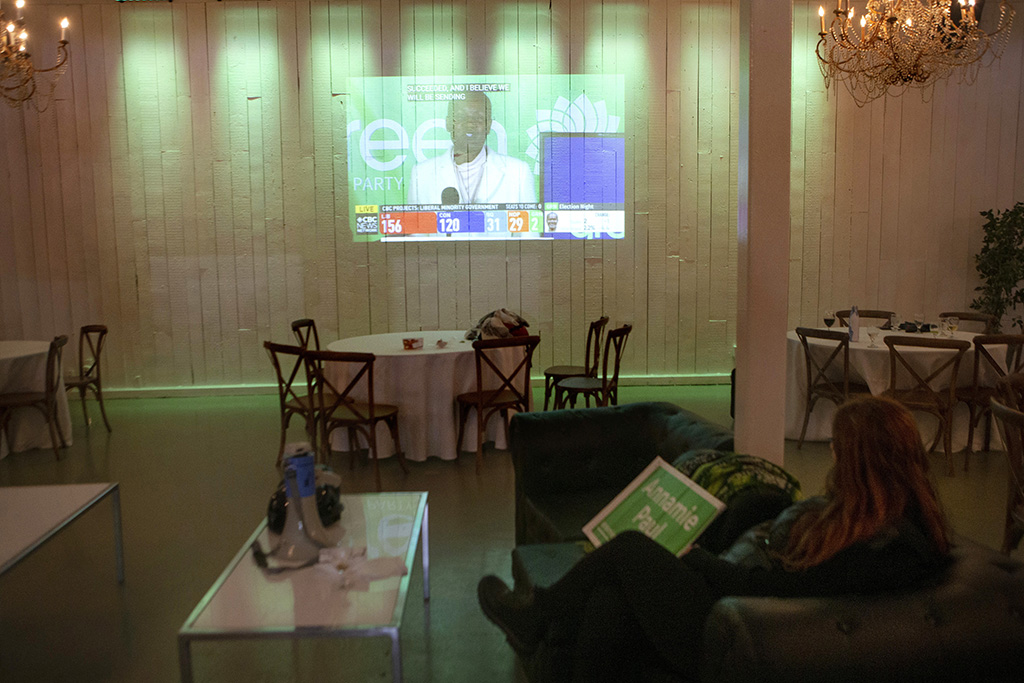
Murray said the GPC has “never understood that politics is a game of addition, not subtraction” and “needs a real open-minded, generous conversation about putting the party first” instead of sniping at one another.
May wants to know why the party did not run a full slate of candidates in this year’s federal election as it did in the six previous national contests. This year, the GPC had candidates running in only 252 of 338 ridings.
“I’m not ruling out some effort at sabotage from some element within the staff,” said May, who said she heard from some reporters that there was “a mole” within the party during the 2019 federal election campaign who leaked negative details about the GPC to the media.
She cited the example of a widely reported incident in which a picture of her holding a compostable cup was Photoshopped to replace it with a reusable plastic cup bearing the Green party logo with a metal straw inside.
“Was it a deliberate attempt to make me look awful?” said May. “Why wasn’t I asked?”
However, May insisted that she is “not pointing a finger of blame” at Paul for any subsequent sabotage, and in fact, wonders if her successor has been targeted too.
At a news conference last month, Paul told reporters that “distractions internally” bogged down the party, and though the Greens had enough potential candidates for a full slate, “we ran into challenges in terms of collecting signatures in all of the ridings — particularly remote ridings or ridings where we’re dependent on seniors who volunteer with us who are very nervous in Alberta and out west where COVID numbers are spiking.”
However, May said it was reasonable to expect the party would have had in place “at least half the slate of candidates six months ahead” of the called election.
May said she was ready to officially run for re-election on Oct. 4, 2020 but was only given the green light to launch her campaign in early 2021.
In the end she was re-elected, and the GPC picked up its first Ontario seat with Mike Morrice’s victory in Kitchener Centre. But the party’s popular vote plummeted from nearly 6.6 per cent (with almost 1.2 million votes countrywide) in 2019 to 2.3 per cent (under 400,000 votes) this year.
“This was an existential threat to our survival,” said May.
Step 5. Professionalize how the party operates
The reason Canadians didn’t see more of Annamie Paul during the election wasn’t lack of money, according to May, but faulty decisions about how and where to spend it. The GPC had at least $1.3 million available through a bank loan to support a 36-day national leader’s tour during the election campaign, May told The Tyee.
May said that it only cost the party about $100,000 when she crisscrossed the country during the 2019 election campaign.
She also said that the GPC had no national campaign manager in the federal election.
Paul’s choices — Phil Spidle, who served as her chief of staff and oversaw her leadership bid, and Sean Yo, who ran her Toronto Centre byelection campaign last year — both declined to sign contracts to manage this year’s election campaign.
The Tyee was unsuccessful in reaching Spidle.
Yo said that he held the national campaign manager role for just over a month on an acting basis earlier this year when the party was expecting the federal election to be called for April 15. But he decided to take a pass on the role, full time, based on what Yo perceived to be “sub-standard management practices” that undermine “basic emotional safety” within the party, and the federal council — at that time — that operated with “a culture of compliance over collaboration,” and which “appears to be adversarial, trenchant and quick to weaponize procedure in bad faith.”
In the end, the GPC went into this year’s federal election “unbelievably, jaw-droppingly” without a national campaign manager, said Yo, who works as a software and IT professional, and served as campaign manager for Ontario Green party Leader Mike Schreiner’s successful 2018 bid to win a seat in the provincial legislature.
On July 7, the Greens’ reputation took another blow when the Globe and Mail reported temporary staff layoffs in Paul’s office. Yo is quoted calling it a “targeted purge” led by interim executive director Dana Taylor against employees “that he sees as enemies.”
May fiercely rejects Yo’s characterization. “We have a unionized staff, and the executive director has no legal way to target anybody,” said May. “The layoffs had to happen under the collective-agreement rules: last hired, first fired.”
Nevertheless, the layoffs made clear the Greens were facing money problems. The party also, sources say, had conducted a leadership contest without ever making clear what the winner would be paid. After she was elected, Paul insisted on a salary far higher than her predecessors, The Tyee was told.
A Green source said that under her employment contract, Paul reportedly receives an MP’s salary, currently at $185,800, plus an annual RRSP contribution of $50,000, with benefits totalling about $250,000.
By contrast, May said that when she was elected leader in 2006, she was paid, with no benefits, $50,000 a year — an amount that increased to $70,000 in 2011. But that year, when she was first elected to the Commons, May stopped receiving the leader’s stipend and only received a paycheque as an MP.
Former federal Green party leader Jim Harris told The Tyee that he received no compensation for his three-and-a-half year leadership (from Feb. 14, 2003 to Aug. 26, 2006) before receiving the $50,000 stipend May received.
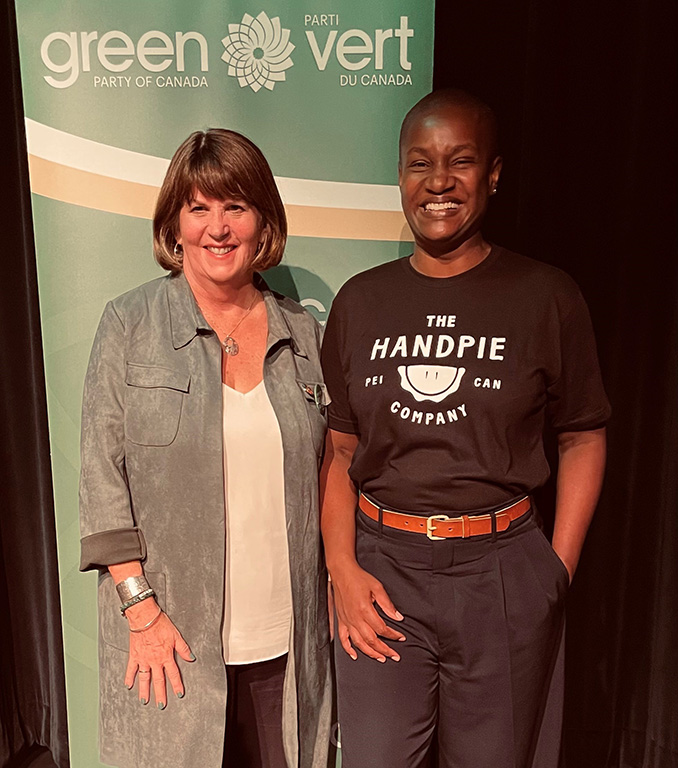
Paul’s employment contract as leader reportedly included an arbitration clause, which she triggered to halt the non-confidence motion she was to face in late July. The arbitrator, a veteran Toronto lawyer reportedly paid an hourly rate of $800 by Green Party of Canada Fund Inc., which oversees financial and legal matters for the federal council, ordered the GPC to delay the vote until the party’s general meeting in August (which itself was delayed because of the federal election).
The GPC has contested the order in the Ontario Superior Court, arguing that the arbitrator erred by issuing the order against the party, since Paul’s employment agreement was with the fund.
Despite the mess, “the party has a lot to learn from Annamie. We’ve been through a difficult transition,” said Roberts, who left the federal council in May to focus on helping to recruit candidates to run in the federal election and pursue a master’s degree.
“I think there were probably inflated expectations on both sides. I don’t think Annamie came in with a clear sense of the job, and I don’t think we had a clear sense of who she was.”
“I also think that our party discipline is weak,” said Roberts. “This is not a debate that we should be having in public — and I think we let her down.”
Paul is “smart, capable and brought diversity” to the GPC, said Roberts. “The difficulty was that there was inexperience on her part and her team’s part. We needed co-operation on both sides, and it didn’t happen.”
Step 6. Address impressions the Greens have a discrimination problem
On June 22, as Green internal turmoil burst into view, exposing harsh criticism of Paul within in the party, the leader gave an interview to The Tyee in which she said that she ran for the Green leadership “as who I am.”
“I am a woman. I am a woman of colour. I’m a Black person. I’m a Jewish person. All of these things were well known to our members, and they voted for me and my platform.”
Paul became leader after the Greens had been flailed for fielding the least racially diverse slate of candidates in the 2019 election other than the People’s Party of Canada.
At her Sept. 27 news conference, Paul said that throughout her time as leader, she had “crawled over… shards of glass” and was “spitting out blood” in what she characterized as “the worst period in my life in many respects.”

One of her toughest moments was when party members expressed dissatisfaction with Paul’s response to the escalating Israel-Palestine conflict in June that left at least 255 dead, most of them Palestinians. Paul tweeted a call for de-escalation and dialogue. Then-Green MP Jenica Atwin called Paul’s stance “totally inadequate,” adding “I stand with Palestine and condemn the unthinkable airstrikes in Gaza. End Apartheid!” The day before, then-Green MP Paul Manly called Israel’s tactics “ethnic cleansing.”
Paul’s senior aide at the time, Noah Zatzman, responded with a Facebook post accusing a number of Canadian politicians, including NDP Leader Jagmeet Singh and unnamed Green MPs of “antisemitism and discrimination,” and vowed to work for their defeat. The party was in an uproar, its federal council scheduling a non-confidence vote if Paul did not renounce Zatzman’s statements, which she never has. Atwin said that is why she crossed the aisle to join the Liberals — though as a Liberal she then walked back her pro-Palestinian statements. She would be re-elected. Manly would lose his seat.
At a June 16 newser, Paul denounced the motion for a non-confidence vote, which was eventually cancelled. She characterized the council’s document as containing “a list of allegations that were so racist, so sexist that they were immediately disavowed by both of our MPs as offensive and inflammatory and contrary to party ethics.”
The Tyee obtained a copy of the three-page resolution that accused Paul of acting “with an autocratic attitude of hostility, superiority and rejection,” and when she had attended the “few” council meetings she did, “displayed anger in long, repetitive, aggressive monologues and… failed to recognize the value of any ideas except her own.”
May found the wording of the motion offside, and said she wants to know more about Paul’s experiences of racism within the party.
But May said she does not know what “episodes” Paul referred to in announcing her resignation. “I’m not doubting she experienced racism, but I don’t know what events she is referencing with ‘shards of glass’ and blood-spitting.”
May finds herself in the position, as a white woman, of being the one who helped mould and lead for 13 years a party her Black, Jewish successor has said is rife with racism, anti-Semitism and sexism. May said she is perplexed that when some look for evidence, they point to her fortunes within the party compared with Paul’s.
“A lot of the narrative to explain racism is they wouldn’t have treated Elizabeth this way,” said May, who doesn’t believe Paul was “denied the things that I had, because I didn’t get much.”
“After I moved to British Columbia in 2009 — because the party asked me to run in Saanich-Gulf Islands — they cancelled all my funding the next year.”
“Annamie had more power and more authority than any leader of the Green party has ever had, but I don’t think that means she believed it. I think she thinks she didn’t have anything like what she expected as leader of the Green party,” said May, who said Paul had a “better deal” with more funds and staff available to her than what May received as leader.
Still resonating are claims made to The Tyee by Zatzman, a self-described “liberal, left eco-Jew” that “the party is tolerant in so many ways, but not for Jewish people — there is no room for dissent from me.”
Former federal Green party president Paul Estrin echoed the claim in a National Post opinion piece. He asserted there is a “continued effort to exclude Jewish-Canadians who are unwilling to check important aspects of their Jewish identity at the door” in a Green party that allows space “for outbursts of Jew-hatred.”
Openly exploring accusations that Paul was undercut by sexist, racist and anti-Semitic elements within the party would either be needlessly bruising or a necessary corrective, depending on who you speak with. Paul is represented by a highly skilled Toronto-based constitutional lawyer, Sujit Choudhry, who happens also to have been accused in 2015 of sexual harassment during his time as dean of the law school at the University of California, Berkeley, and resigned protesting his innocence.
May now wants the GPC “to turn the page,” but first wants “an independent investigation” launched on the charges of racism Paul has levelled against the party and the federal council, which following an August election, as May pointed out, now includes Lisa Gunderson, who is Black and serves as English vice-president.
May’s predecessor, Harris, believes such an inquiry is “absolutely essential.”
“I don’t think Annamie will like it,” he said, “because what will come out of it is the toxic environment that she created. At the same time, we will learn the specific examples that she has experienced that are racist, sexist, misogynist, anti-Semitic. She has made vague allegations consistently for months and I have not seen the evidence.”
Harris referred to comments Yo made to the Toronto Star in April in which he said Paul was forced to work for three months without an employment contract and said that “it’s very hard not to see this process through the lens of race, gender and religion.”
Yo, whose father is of Chinese-Indonesian heritage and mother has a Scottish-Acadian background, said that “what Annamie has done has been to share her lived experience.”
He believes that any inquiry “into a particular experience would substantively fail to shed light on systemic racism in the party because one person’s experience won’t capture or describe it — not by a long shot.” In Yo’s view, Paul experienced “systemic — not overt — discrimination based on her race, gender and religion.”
“This is a moment for soul-searching and for us as party members to ask ourselves what kind of culture we are going to have,” he said.
Step 7. Revisit how power flows in the Green party
When Annamie Paul won the leadership of the federal Greens, “All of us assumed we would form a strong team — and that didn’t happen,” said Murray. “I would hope that there’s a seat at the table for everyone who’s been involved. Pluralism and inclusion are the core values of the Green party.”
“It’s a party with a lot of talent — and a real communications problem.”
A big part of that problem, said Harris, is who controls what gets said publicly, and that in turn hinges on where power is concentrated presently within the party.
“Annamie wanted all power over all communications; hiring and firing of her staff; MPs were not allowed to speak to media — this is centralization of authority that [former Conservative PM Stephen] Harper would have been proud of. She tried to graft onto a party that believes in decentralization and local empowerment,” said Harris, who ran for the Greens in four federal elections in different ridings in Toronto, where he lives.
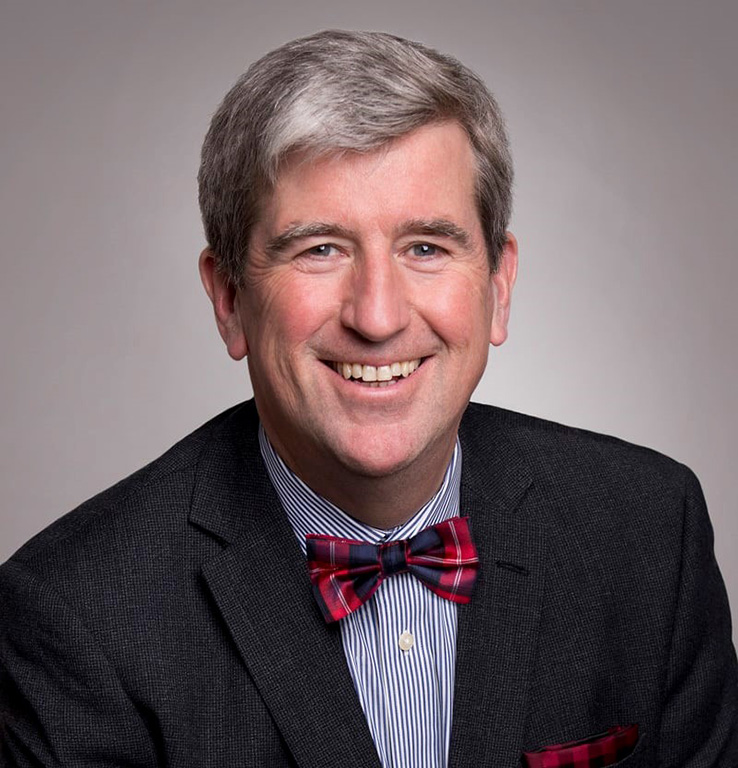
Murray thinks Canada’s federal Greens need to look afar for new models of internal governance. “We should send a delegation of people involved in the decision-making process of the party to Germany and New Zealand to see how their Green parties are organized.
“In the Green party, we are far away in our operations and in our practices from anything that looks like an inclusive team approach — and we need to get there quickly. That works needs to start soon.”
“It is hard work, but that’s what politics is,” said Murray, who recounted how difficult it was for him as a gay man to enter Winnipeg municipal politics in 1989.
“I had to wear a Kevlar jacket in my first few days as a city councillor, because people were making attempts on my life. Someone set my house on fire; my dog was killed after being poisoned,” he explained.
“I never talked about this publicly when it happened, because one of the hardest things you learn about politics is that it’s not about you — it’s about everybody else, and that’s what makes it so lonely.”
Yo said the GPC party “needs to change its culture,” and “get on the same page and decide what kind of party we are going to be, and the federal council and the fund need to lead and live their accountabilities as governance bodies.”
“A huge challenge we faced for some time is the degree to which those two organizations have strayed from their governance role to influencing or taking direct control of operations of the party.”
Step 8. Settle Elizabeth May’s place in the Greens
There is simmering disagreement over whether May was an asset or obstacle to Paul’s efforts to succeed as leader.
A week after the disastrous election, Paul’s executive assistant, Victoria Galea — who also ran as a Green candidate in the Ontario riding of Hamilton West–Ancaster-Dundas — told news outlets “there definitely could have been more room cleared from the outgoing leader for our new leader to have growth and success” and that May was among those in the party who “set [Paul] up for failure.”
Those remarks were “hurtful and without any factual basis,” and amounted to “character assassination,” said May, who was the first federal Green to win a seat in Parliament and remains half the caucus. “I don’t know what the motivation was to say such things.”
Galea did not respond to an interview request.
May said she’s dismayed that her developing friendship with Paul somehow soured over a one-year period.
“She had been my top choice,” said May, who noted that she could not formally endorse any of the leadership candidates in 2020.
“I did everything she asked of me,” said May, who campaigned for Paul in the Oct. 26, 2020 Toronto Centre byelection in which the then-newly minted Green leader placed second behind Liberal Marci Ien, who won the riding. May went on to help raise money for Paul’s 2021 run and donated $1,000 of her own.
“I just tried so hard to please her, and kept shrinking my role and not doing interviews, and not doing press releases and press conferences. But her impression was that I was still taking up too much space and undermining her, because I was still sending email to staff. She kept saying, ‘You need to shrink, you need to shrink.’ That was a problem because I kept trying to do exactly what she wanted.”
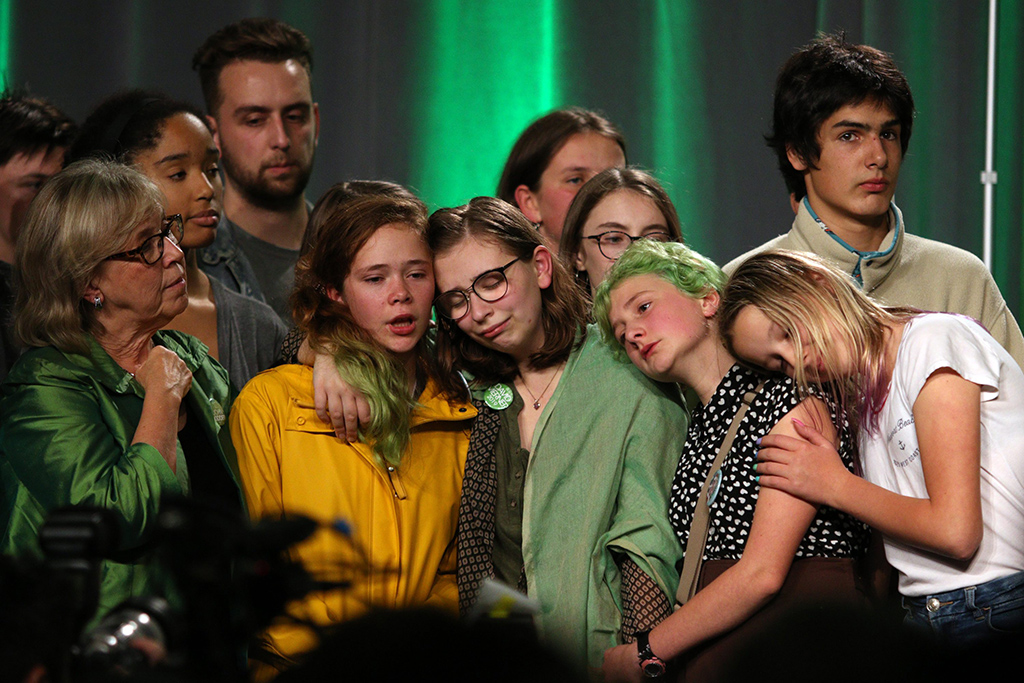
May said she offered Paul the chance to run in Saanich-Gulf Islands after her byelection loss and still hopes that Paul would run again as a Green candidate.
“I knew she had to put herself forward completely to replace me in the public’s mind as leader,” said May, who feels “devastated” and “fundamentally baffled” by the treatment she received from Paul, including not being notified in advance that Paul was coming to B.C. to campaign in the recent federal election.
May said that her campaign team and Manly’s were only given notice on Friday night before Paul’s arrival at Victoria’s airport — situated in May’s riding — the following morning, two days before the Sept. 20 election.
However, Yo insists that May “had a role to play but she chose not to” during Paul’s brief leadership.
“I am absolutely positive that had she said, ‘Annamie, I’d like to come out with a statement to support you during this time,’ it would have been perfectly fine,” he said.
After Atwin departed the Greens, citing lack of support following Zatzman’s tweet, May and Manly issued a statement saying they were “heartbroken at the loss of our dear colleague Jenica Atwin from the caucus” and were clear in laying blame. “Unfortunately, the attack against Ms. Atwin by the Green party leader’s chief spokesperson on May 14 created the conditions that led to this crisis.”
Then added: “We (Paul Manly MP, Elizabeth May MP) have no intention of leaving the Green Party of Canada.”
Yo notes the statement made no mention of Paul and considers it a rough abandonment of the party leader by her two remaining MPs.
Zatzman, too, has accused May of being overcontrolling and failing to adequately support Paul.
But former GPC candidate Daniel Green said it’s May who has been unfairly victimized. The environmental toxicologist who ran in Quebec four times at the federal level and served as one of May’s deputy leaders from 2014 to 2019, said that his former boss “went out of her way to help Annamie. Elizabeth now feels like she’s been stabbed in the heart.”
“The sad thing with this party is that there are a lot of victims, and Annamie is not the only one. There are a lot of people hurting in this party, and the fact that Annamie refused to accept any responsibility of what happened is unconscionable,” said Green.
When Jo-Ann Roberts is not immersed in the drama gripping the party she helped lead, she is writing a book about threats to democracy. As she surveys the massive job that lies ahead in reviving Green prospects, she offers her biggest desire. She wants all party members to take time for deep reflection on what comes next.
“We need to think about who and what type of person we want as leader,” said Roberts, who has no interest in the job. “We also need to decide who we are as a party.” ![]()
Read more: Federal Politics



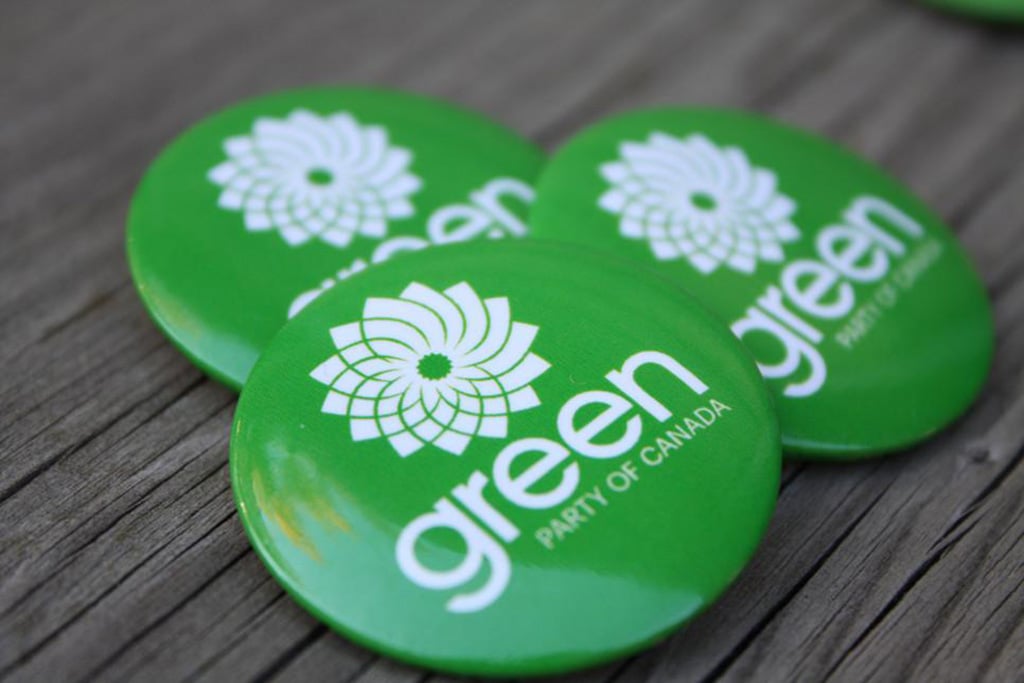












Tyee Commenting Guidelines
Comments that violate guidelines risk being deleted, and violations may result in a temporary or permanent user ban. Maintain the spirit of good conversation to stay in the discussion.
*Please note The Tyee is not a forum for spreading misinformation about COVID-19, denying its existence or minimizing its risk to public health.
Do:
Do not: